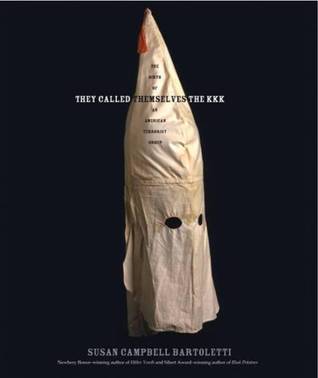They Called Themselves the K.K.K: The Birth of an American Terrorist Group--Susan Campbell Bartoletti
August 2010 by Houghten Mifflin Books for Children
172 pages--Goodreads
"Boys, let us get up a club."
With those words, six restless young men raided the linens at a friend’s mansion in 1866. They pulled white sheets over their heads, hopped on horses, and cavorted through the streets of Pulaski, Tennessee. Soon, the six friends named their club the Ku Klux Klan and began patterning their initiations after fraternity rites, with passwords and mysterious handshakes. All too quickly, this club would grow into the self-proclaimed “Invisible Empire,” with secret dens spread across the South. On their brutal raids, the nightriders would claim to be ghosts of Confederate soldiers and would use psychological and physical terror against former slaves who dared to vote, own land, attend school, or worship as they pleased.
This is the story of how a secret terrorist group took root in America’s democracy. Filled with chilling and vivid personal accounts unearthed from oral histories, congressional documents, and other primary sources, this is a book to read and remember.
This is a very interesting and compelling read. They Called Themselves the K.K.K. does a wonderful job of contextualizing the Klan within the Reconstruction. I appreciate that Bartoletti uses this book to really try to understand the Klansmen, their reasons, and their motivations. Rather than just condemning the acts of the Klan, which we already know are wrong, the book explores why a person would be driven to join a hate group and do monstrous things. This is what I like best about this book and this is exactly where Superman Versus the Ku Klux Klan falls very, very flat. I read non-fiction to understand, not to rehash oversimplified good-bad dichotomies.
On that note, I love the quote by W.E.B. Du Bois about Klansmen: "These human beings at heart are desperately afraid of something. Of What? Of many things, but usually of losing their jobs, being declassed, degraded, or actually disgraced; of losing their hopes, their savings, their plans for their children; of the actual pangs of hunger, of dirt, of crime." I think fear is a big part of what drives prejudice.
This book focuses on the early development of the Klan during Reconstruction. I expected it to spend more time on the Jim Crow Era and the Civil Rights movement. It's still good, and I will definitely be able to use Chapter 6 about Klan violence against sharecroppers during my Roll of Thunder unit.
The audiobook for They Called Themselves is excellent, but somethings just don't work well in that format, specifically the timeline. The physical book is a good balance of text, white space, insets, and pictures, though the dialects might be difficult to understand in print. The source material occasionally uses offensive language or images, but it is handled tastefully. Bartoletti doesn't censor the history.
The source notes are definitely worth a look, especially the bit about Bartoletti's visit to a modern day Klan meeting. It's creepy. The Klan still uses the same rhetoric and fans the flames of the same fears about people who are different. Children are still learning this close-minded life view, and not just in Klan families. These same arguments are prevalent in today's politics, though in a diluted form. That's why meaningful interaction with people who are different from you is important.
All in all, They Called Themselves the K.K.K. is a well researched, engaging, well crafted narrative and excellent non-fiction text.

No comments:
Post a Comment